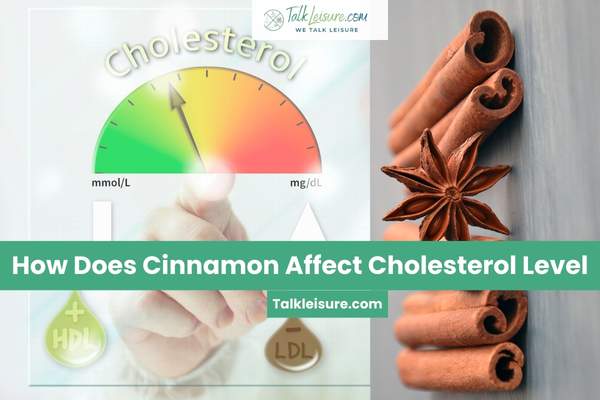Cinnamon is a well-known spice that has been used for centuries for its flavor and medicinal properties.
In recent years, research has focused on its potential benefits for heart health.
This article explores the relationship between cinnamon and heart health, examining the scientific evidence behind its use as a natural remedy.
We will also delve into the prevalence and causes of heart disease, as well as how cinnamon may affect cholesterol levels, blood pressure, blood sugar management, and inflammation.
Furthermore, practical suggestions on how to incorporate cinnamon into your daily routine will be provided.
Let’s dive into the research to uncover the potential benefits of cinnamon for heart health.
What Is Cinnamon?
Cinnamon is a spice derived from the inner bark of several tree species from the Cinnamomum family.
It is widely known for its warm and sweet flavor, making it a popular ingredient in both sweet and savory dishes.
Besides being a culinary delight, cinnamon has a long history of being used medicinally.
It is believed to have originated in Sri Lanka and was highly sought after by ancient civilizations for its healing properties.
Today, cinnamon is widely recognized for its potential health benefits, particularly about heart health.
How Does Cinnamon Benefit Heart Health?
Cinnamon has been touted as a natural remedy for various health conditions, including heart health.
But how exactly does cinnamon benefit heart health?
Research suggests that cinnamon may help improve heart health in several ways.
Firstly, it has been found to have a positive impact on cholesterol levels.
Studies have shown that cinnamon can lower LDL (bad) cholesterol and triglyceride levels while increasing HDL (good) cholesterol levels.
Additionally, cinnamon may help regulate blood pressure by reducing inflammation and improving blood vessel function.
Moreover, cinnamon has been shown to have anti diabetic effects, which can benefit individuals with diabetes or pre-diabetes, who are at higher risk for heart disease.
Overall, these findings suggest that incorporating cinnamon into your diet may have potential benefits for heart health.
What Is the Prevalence of Heart Disease, and What are Some Key Aspects Associated With It?
Heart disease is a leading cause of mortality worldwide.
According to the World Health Organization (WHO), it is the leading cause of death globally, accounting for approximately 17.9 million deaths each year.
This translates to about 31% of all deaths worldwide.
In the United States alone, heart disease claims the lives of around 655,000 people annually, making it the leading cause of death in the country.
These statistics highlight the alarming prevalence of heart disease and underscore the need for effective prevention and management strategies.
It is important to understand the risk factors and explore potential natural remedies like cinnamon that may contribute to improved heart health.
Causes of Heart Disease
Heart disease is a leading cause of death worldwide, and understanding its causes is crucial for prevention and management.
Several factors contribute to the development of heart disease.
The primary cause is the buildup of fatty deposits called plaque in the arteries, leading to a condition called atherosclerosis.
This buildup narrows the arteries and restricts blood flow to the heart, increasing the risk of a heart attack or stroke.
Other causes include high blood pressure, high cholesterol levels, smoking, obesity, diabetes, and a sedentary lifestyle.
Genetic factors, age, and gender also play a role in the development of heart disease.
By addressing these causes, individuals can reduce their risk and promote heart health.
How Does Cinnamon Affect Cholesterol Level?

Cinnamon has shown potential in lowering cholesterol levels, which is crucial for maintaining heart health.
Research suggests that cinnamon can reduce total cholesterol, LDL (bad) cholesterol, and triglyceride levels, while increasing HDL (good) cholesterol.
The active compounds in cinnamon, such as cinnamaldehyde and cinnamic acid, are believed to be responsible for these cholesterol-lowering effects.
These compounds work by inhibiting enzymes involved in cholesterol synthesis and enhancing the metabolism of cholesterol in the liver.
One study conducted on individuals with type 2 diabetes demonstrated that consuming cinnamon extract for 12 weeks resulted in significant reductions in total cholesterol, LDL cholesterol, and triglyceride levels.
Another study showed that cinnamon supplementation reduced total cholesterol and triglyceride levels in people with polycystic ovary syndrome.
The mechanisms behind cinnamon’s cholesterol-lowering effects are still being investigated.
It is believed that cinnamon may inhibit an enzyme involved in cholesterol synthesis, leading to decreased cholesterol production.
Additionally, cinnamon may increase the activity of receptors that remove cholesterol from the bloodstream.
What Are The Effects of Cinnamon on Blood Pressure?
Cinnamon has been found to have a positive effect on blood pressure levels.
Research suggests that cinnamon may help lower blood pressure by relaxing the blood vessels and reducing the resistance of blood flow.
This is due to the presence of compounds in cinnamon, such as cinnamaldehyde and cinnamic acid, that have been shown to have vasodilatory effects.
Vasodilation helps to widen the blood vessels, allowing for better blood flow and lower blood pressure.
A study conducted on 59 individuals with type 2 diabetes found that consuming cinnamon daily led to a significant reduction in systolic and diastolic blood pressure levels.
Another study involving 116 participants with prediabetes revealed that cinnamon supplementation resulted in decreased blood pressure levels compared to the control group.
How to Use Cinnamon for Blood Pressure Control?
To incorporate cinnamon into your daily routine for blood pressure management, you can add it to various foods and beverages such as oatmeal, yogurt, tea, or smoothies.
Additionally, cinnamon sticks can be infused in hot water to create a soothing and aromatic cinnamon tea.
What Are the Impacts of Cinnamon on Blood Sugar Management?
Cinnamon has been found to have beneficial effects on blood sugar management, particularly in individuals with diabetes.
Research suggests that cinnamon may help lower blood sugar levels by increasing insulin sensitivity and decreasing insulin resistance.
Cinnamon contains compounds that mimic the action of insulin, allowing glucose to enter cells more effectively and reducing glucose buildup in the bloodstream.
This can lead to improved glycemic control and potentially reduce the risk of complications associated with diabetes.
Several studies have shown promising results, indicating that cinnamon supplementation may help lower fasting blood sugar levels and improve insulin sensitivity in individuals with type 2 diabetes.
How Does Cinnamon Reduce Inflammation?
Cinnamon has been shown to have anti-inflammatory properties that contribute to its potential benefits for heart health.
Research suggests that cinnamon contains compounds such as cinnamaldehyde and cinnamic acid, which possess anti-inflammatory properties.
These compounds have been found to inhibit the production of inflammatory substances in the body, including cytokines and enzymes.
By reducing inflammation, cinnamon may help to prevent damage to the blood vessels and arteries, which can contribute to the development of heart disease.
Inflammation plays a significant role in the formation of plaque within the arteries, a condition known as atherosclerosis.
How to Use Cinnamon for Heart Health?

When it comes to using cinnamon for heart health, there are a few ways to incorporate it into your daily routine.
One simple method is to sprinkle cinnamon on your morning oatmeal or add it to your coffee or tea.
You can also mix cinnamon into smoothies or yogurt for a delicious and heart-healthy boost.
Another option is to take cinnamon supplements, which are available in capsule or powder form.
However, it’s important to consult with a healthcare professional before starting any new supplements, as they may interact with certain medications or have side effects.
Dosage and Intake of Cinnamon for Heart Health
When it comes to using cinnamon for heart health, it’s important to consider the right dosage and intake.
The recommended dosage of cinnamon varies depending on the form you choose – powdered, capsule, or oil.
For powdered cinnamon, a common recommendation is 1 to 6 grams per day, which can be divided into multiple doses.
Capsule form may range from 500 to 2,000 milligrams per day.
Cinnamon oil should be used sparingly and diluted in a carrier oil before applying topically.
What Precautions and Considerations Should be Taken into Account When Using Cinnamon?
While cinnamon is generally safe for consumption, it is possible to have an allergic reaction to it.
If you have a known allergy to cinnamon or other spices, it is best to avoid using it.
Additionally, cinnamon may interact with certain medications, such as blood thinners.
If you are taking any medications, it is recommended to consult with your healthcare provider before incorporating cinnamon into your routine.
Moreover, excessive consumption of cinnamon can lead to liver damage, so it is crucial to use it in moderation.
Conclusion
In conclusion, research suggests that cinnamon possesses potential benefits for heart health.
With its ability to lower cholesterol levels, regulate blood pressure, manage blood sugar, and reduce inflammation, cinnamon may contribute to maintaining a healthy heart.
However, it is important to note that while cinnamon can be a natural remedy, it should not replace medical advice or prescribed treatments for heart disease.
Further research is needed to fully understand the mechanisms and potential applications of cinnamon in heart health.
As always, it is recommended to consult with a healthcare professional before incorporating cinnamon or any supplement into your regular routine.
FAQs
01.Which Variety of Cinnamon Is the Healthiest?
The two main varieties of cinnamon are Cassia cinnamon (also called “Chinese” cinnamon) and Ceylon cinnamon (sometimes called “true” cinnamon).
Due to its lower coumarin concentration than Cassia cinnamon, Ceylon cinnamon is generally thought to be the healthier choice in terms of health benefits.
Cinnamon is one of the many plants that naturally contain coumarin.
On the other hand, excessive coumarin consumption has been linked to possible liver damage and other health issues.
Compared to Ceylon cinnamon, cassia cinnamon has higher coumarin concentrations.
Ceylon cinnamon is often recommended for those who consume cinnamon regularly or in larger quantities due to its lower coumarin levels.
02.What are Healthy Alternatives for Cinnamon?
Depending on the flavor profile you want, there are a few possibilities to take into consideration while searching for a healthy alternative to cinnamon in recipes or as a flavoring agent:
Nutmeg: It can be used in many recipes in place of cinnamon and has a toasty, somewhat sweet flavor.
Cardamom: It has a distinct, fragrant flavor with hints of citrus, mint, and spice.
Ginger: Although it tastes different from cinnamon, ginger may give food a cozy, somewhat spicy flavor.
Cloves: When combined with other spices, cloves can be used as a substitute for cinnamon in some recipes due to their strong, pungent flavor profile and hint of sweetness.
Vanilla: While pure vanilla extract or paste can’t duplicate the spicy flavor of cinnamon, they can give food a hint of sweetness and complexity.
Best Wishes!






